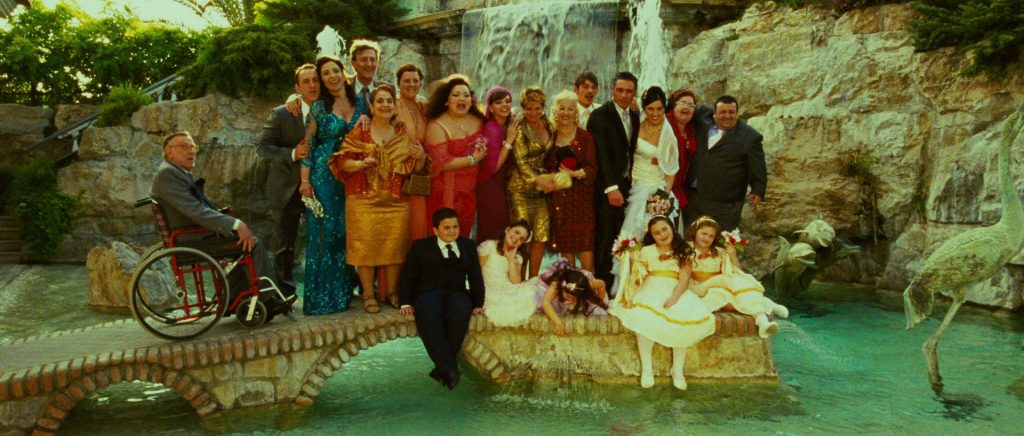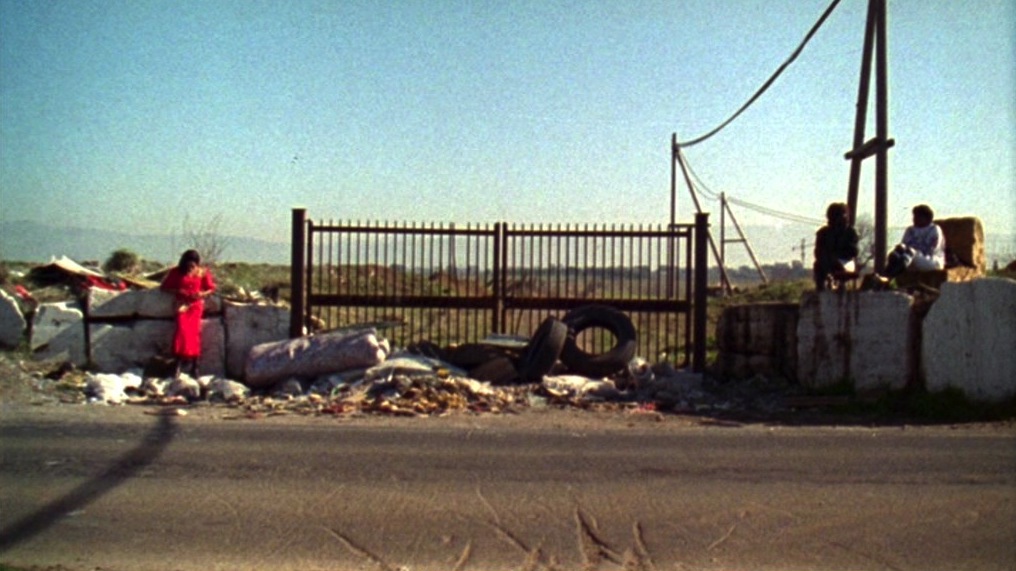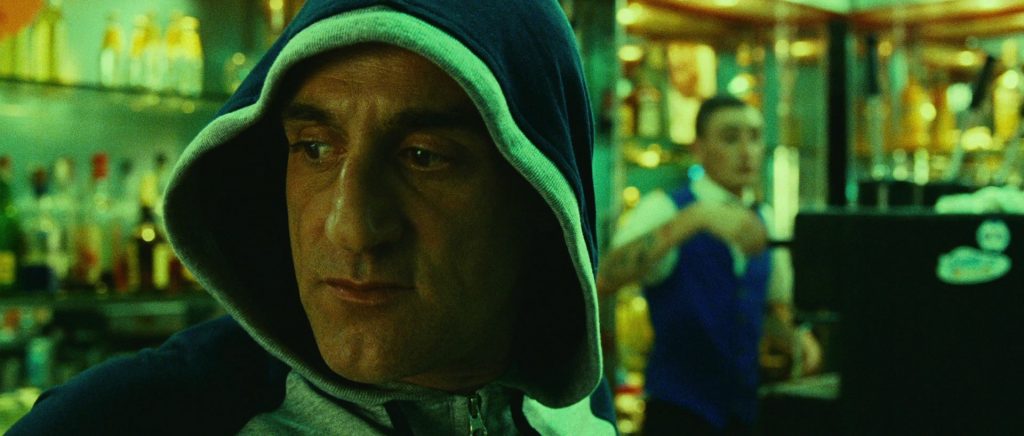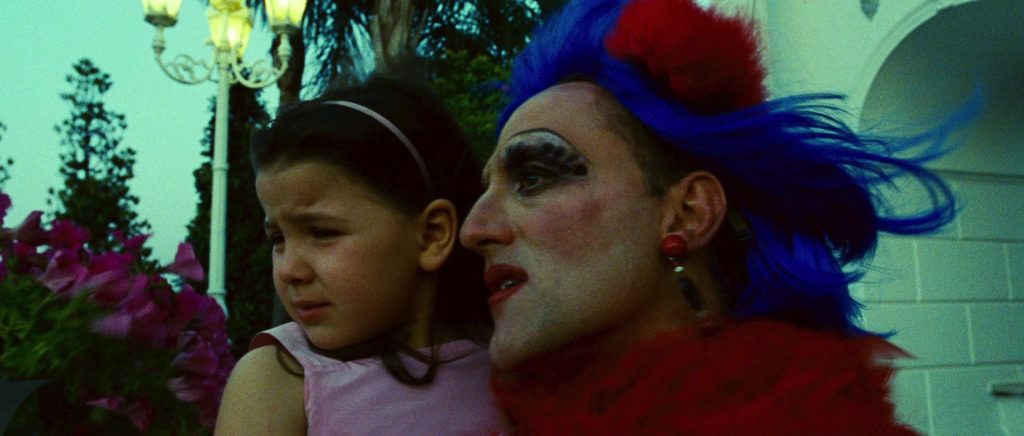“We’re all being observed,” insists a wise yet blithely unheeded elder midway through Matteo Garrone’s celebrity-culture satire Reality. As a genuine but naïve spokesman for his homeland’s historically Catholic mindset, this piazza philosopher is too devout to realize that the all-seeing deity to whom he ascribes ubiquitous, benevolent power has been irrevocably replaced in the public consciousness of Berlusconi’s Italy by the panoptic viewfinder of “Big Brother”—not the Orwellian symbol of fascist oppression, but the reality TV sensation. Divine intervention no longer comes from the Vatican (though the Papa, decked out in fashionable purple vestments, is ready for his close-up); rather, miraculous transcendence occurs only for those chosen to play grotesque versions of themselves for the veneration and ridicule of the masses watching at home.
As contemporary Italian cinema’s alternately outraged and bemused moralizer, Garrone agrees with his minor character’s major statement. Of course we’re all being observed, but in Garrone’s oft-explored Naples—as in so much of the western world—it’s the media and the mafia (or some equally threatening cabal of organized crime, whether blue- or white-collar) that have the entire country under surveillance, its dazed denizens either married to the mob or scrambling for their moment in the spotlight.
Garrone’s films range from finely wrought character studies to panoramic cultural critiques. Uniting their otherwise diverse storylines and stylistic approaches is a career-long preoccupation with forces that are beyond the control of his hapless protagonists, a ragged assortment of two-bit mobsters, determined refugees, obsessive outsiders and scheming dreamers both celebrated and scorned for their tribulations. These forces—most memorably epitomized by the Camorra crime syndicate in the 2008 Cannes Grand Jury Prize–winning Gomorrah, and by pop culture in the distracting guise of famous-for-being-famous wish-fulfillment via reality TV in Garrone’s second Grand Jury Prize winner—can be resisted, but his holy innocents and cynical hypocrites alike inevitably succumb to Grande Fratello in the end.
Garrone was born in Rome in 1968 to artist parents, and from an early age gravitated toward creative endeavors. He focused on painting until the mid-1990s, at which point he made a short film that garnered the attention of esteemed writer/director Nanni Moretti. While on location in Naples to research a documentary about a famous wedding photographer, Garrone was struck by the region’s crumbling baroque grandeur and hardscrabble yet boisterous residents, a landscape and people to which he would later return.
Back in Rome, Garrone made his first feature, Terra di mezzo, comprised of three vignettes detailing the struggles of immigrant communities in the capital. He followed his debut with Ospite, an uncharacteristically upbeat story of two young Albanians navigating the Eternal City’s social strata.
Garrone’s outlook turned sinister in the genuinely unsettling The Embalmer, in which disenfranchised dwarf Peppino, the titular preserver of corpses and literal little man in the Neapolitan underworld, befriends hunky waiter Valerio and smoothly seduces the unsuspecting stud by plying him with hard drugs, easy women and taxidermied animals. The decomposing body stinking up this doomed bromance, of course, is Naples itself, rotten to the core with desperation and depravity. Critics noted Garrone’s understated directorial skill, his ability to illicit strong performances (the Danny DeVito–like Ernesto Mahieux as Peppino is a marvel of pathetic repulsion) and his astute sociopolitical analysis embedded in a truly unique character study.
This approach was further honed in Primo Amore, an even darker tale of obsessive possession and sadomasochistic seduction in which a persnickety goldsmith goads a none-too-confident woman into anorexia-induced body modification so that her corporeal form will match his feminine ideal. Set in the overgrown forests of Verona, this grim fairytale is Garrone’s apotheosis of interpersonal dysfunction to date.
Wisely, Garrone significantly broadened his exploration of personal and societal corruption by next adapting Gomorrah, Roberto Saviano’s best-selling exposé of “the System,” as the Southern Italian mob network is known. Garrone’s epic brilliantly intertwines five narrative strands that reveal the Camorra’s insidious reach into virtually every aspect of daily life, from drug trafficking and toxic-waste dumping to gang initiations and designer-dress manufacturing. For the film’s two gun-toting teenagers who idolize Al Pacino’s swaggering Tony Montana in Scarface, the only way out of the muck and mire of their crime-infested milieu is early death.
For Luciano, the fishmonger family man in Reality, the only escape from a seemingly pleasant quotidian existence is a once-in-a-lifetime chance to appear on Grande Fratello. Envious of Enzo, the smarmy local-boy-made-good whose appearance on the show has earned him overnight access to la dolce vita and who spews empty platitudes like “never give up” and “don’t stop believing,” Luciano grows increasingly obsessed with the series and believes he is destined to be selected as a contestant. Following a promising audition at Cinecittà (Rome’s storied film studio, now utilized just as often for cheap TV) Luciano prepares for his fifteen minutes of fame. Astute viewers of Garrone’s previous films would be correct in suspecting that Luciano’s plans go wildly awry. Meanwhile, Garrone mocks the sanctity of the church as a somber service is interrupted by a petty squabble over a stolen pasta maker, and ritual is drained of meaning with a quick spritz of holy water.
Reality’s surreal tragicomedy is greatly enlivened by the nuanced lead performance of Aniello Arena, who Garrone discovered as part of a prison theatre troupe. Arena is currently serving a life sentence for murder committed when he was much younger and involved in the mafia underworld; fittingly, police were present at all times during the film shoot, keeping a watchful eye on the convict as he portrayed an unknown dreaming of becoming a star, an irony not lost on the filmmaker.
“This is Italy today,” Garrone remarked of the film in a 2013 interview with The Guardian. “Pasolini was talking about it back in 1975, how we were changing, anthropologically, as we were surrendering to consumerism. I don’t think Luciano is so far from me; we are all flawed. We can be victims of the system and also complicit in it too. That is true of the characters in both Gomorrah and Reality.”
While not defined by membership in any official filmmaker cohort, Garrone is loosely affiliated with contemporaries Luca Guadagnino (I Am Love) and Paolo Sorrentino (The Great Beauty), with whom he shares a penchant for depicting the glories and foibles of contemporary Italian society through clever updates of familiar genres, from gangster sagas to melodramas. These filmmakers are perhaps unavoidably indebted to their forebears, respectful of Rossellini’s salt-of-the-earth neorealism, Visconti’s aristocratic elegance, Fellini’s grotesque flourishes and Bertolucci’s operatic extravagance yet never tethered too closely to any of their national cinematic traditions. Rather, they pay playful homage to the masters while deftly pursuing their own storytelling tropes, visual strategies and divergent thematic concerns.
Up next for Garrone? His first English-language feature, The Tale of Tales, a customarily ambitious project based on a trio of short stories by seventeenth-century fabulist Giambattista Basile, whose earthy folktales are considered precursors to Boccaccio’s The Decameron. Salma Hayek and Vincent Cassel are slated to star, but whether they and their tales are imbued with brightly colored, cautious optimism or shot through with bleached-out, brutal cynicism remains to be seen. Such is the dynamic tension at work in Garrone’s films.










